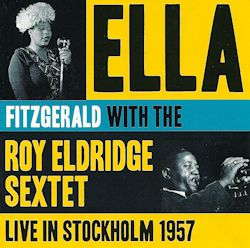1. Announcement by Norman Granz
2. Undecided
3. Embraceable You
4. School Days
5. Lester Leaps In
6. Moonlight in Vermont
7. Bugle Call Rag
8.
Norman Granz introduces Ella Fitzgerald
9. Singing the Blues
10. Angel Eyes
11. Lullaby of Birdland
12. Tenderly
13. Do Nothing till You Hear from Me
14. April in Paris
15. I Can't Give You Anything but Love
16. Love for Sale
17. It Don't Mean a Thing
18. Final announcement
Ella Fitzgerald - Vocals (tracks 9-17)
Roy Eldridge - Trumpet, vocals (tracks 2-5, 17)
Stuff Smith - Violin (tracks 6, 7, 17)
Oscar Peterson - Piano (tracks 2-7)
Don Abney - Piano (tracks 9-17)
Herb Ellis - Guitar
Ray Brown - Bass
Jo Jones - Drums
Who has been the greatest talent-spotter in jazz? My money would be on Norman Granz, who brought Oscar Peterson to world fame and even realised that Fred
Astaire would make interesting rceordings with a small jazz group. He also advanced the careers of many jazz musicians by including them in his "Jazz at
the Philharmonic" concerts. Perhaps most significant of all, he realised just what an important singer Ella Fitzgerald could be: getting her to record the
Songbooks which are classic recordings of the Great American Songbook. Of course, Granz also showcased Ella in many JATP concerts, such as this one in
April 1957 at the Konserthuset in Stockholm.
The concert was divided into two halves: the first featuring Roy Eldridge, the second featuring Ella. Eldridge performs Undecided with his usual
mixture of vigour and erraticism, playing with gusto despite the occasional fluff. The Oscar Peterson Trio supplies the perfect swinging backing, and Oscar
contributes a dextrous solo. Eldridge shows that he can play a ballad with tender control on Embraceable You, then reverts to the powerhouse
trumpeter-cum-vocalist on School Days. He starts with equal vehemence in Lester Leaps In but it turns into a feature for drummer Jo
Jones, who performs a solo which never seems to change. Violinist Stuff Smith replaces Roy Eldridge for the next two tracks: a heart-wrenching
interpretation of Moonlight in Vermont and a fierce Bugle Call Rag, to which Peterson and Ellis add swinging solos.
Then Ella Fitzgerald arrives to sing in a way that underlines why the British jazz critic Benny Green called her "the best equipped vocalist ever to grace
the jazz scene". She had perfect pitch, clear intonation, phrasing which used her voice as a musical instrument, and an ability to improvise with ecstatic
freedom. Listen, for example, to her ending of Angel Eyes which may give the impression that she is losing her way but she is actually improvising
with the greatest daring, which works out just fine. In Tenderly, her voice swings around the notes with melismatic freedom. In I Can't Give You Anything but Love, she imitates Rose Murphy and Louis Armstrong. And note how, in Love for Sale, she runs "anything but
true love" into "Love for sale" - using the word "love" just once to bridge the gap. The fact that she could choose Singing the Blues, which had
been a pop hit for Guy Mitchell the year before, shows the breadth of repertoire she was willing to undertake.
All the musicians except Oscar Peterson assemble for It Don't Mean a Thing, where Ella scats and several musicians take solos. As at most JATP
concerts, it combines musical skill with exuberant excess. Norman Granz announces "No more music" but you wish it could go on forever.
Tony Augarde
